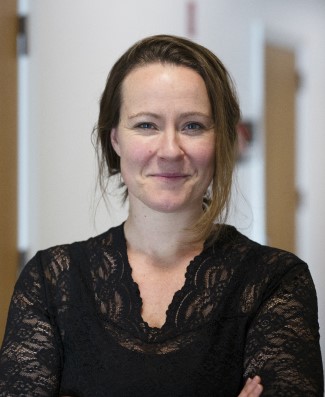Lise Degn
MSc Social Science, Political Communication and Management from Copenhagen Business School, PhD student at CFA from 2010 to 2014
Supervisor: Niels Mejlgaard. Co-supervisor: Finn Hansson.
How would you describe your job?
I am assistant professor at CFA where I do a mixture of research, teaching and management. I am currently working on several different research projects. One of these is a project about quality and quality perceptions in higher education, which I co-manage with a colleague. I am in charge of performing “practical” research, collecting data and so on, and for coordinating the work in the project overall. I have a similar role in an EU-funded project about responsible research and innovation. In this project we work with different universities and funding agencies, on various initiatives to promote gender equality, ensure integrity in research, and convince researchers to involve society to a higher degree.
In addition, I teach a course on evaluation and quality assurance in the diaconia program, and soon I will teach organizational sociology to political science students.
What was the topic of your PhD project?
In very broad terms, I wrote about how the management function at Danish universities has changed over time. In particular, I zoomed in on how the radical university reform of 2003 had affected management roles. Before the reform, head of department was a part-time position, the head was chosen by colleagues, and very often the senior academics to took turns to fill the position. After the reform, heads of department were appointed by the university management, and the position was full time.
The empirical part of my project was a qualitative study in which I interviewed heads of department at two Danish universities. I was interested in their experiences with the change of role. In my opinion, it always makes sense to study the consequences of large reforms. In relation to universities specifically, it is relevant to society to get a better understanding of how they work. They are massive organizations and a huge expenditure for the state, but we know very little about how they actually work. We need this knowledge to say something about whether they could be organized more efficiently or appropriately.
How will your PhD degree benefit you in your current job?
I rarely look at my dissertation, but I actually did check it recently because I needed to grasp some theory. Even though I rarely leaf through my dissertation, I still very much draw on the theoretical foundation I developed during my PhD project.
My PhD degree has also helped me establish my very beneficial network. Your network has a huge influence on which projects you are invited to join. I did my exchange visit in Oslo where I met many nice and talented people. And these people are now employed many different places in the world. When they become involved in something interesting, I often get a tap on the shoulder.
How did you experience doing a PhD at CFA?
Being a PhD is great and rewarding – but it was also really difficult in the beginning. I remember that on the first day, my supervisor walked me to my office and then he said, “OK, well off you go.” And then I sort of sat there for three days. But when I shook off the initial paralysis of not really knowing what to do, I started reading. Read, read and read, and after that, I started writing. I started out by writing an academic article that was flat out rejected, so I put it in the drawer and started over. But it didn’t take long before I felt more comfortable in the role as PhD student and relaxed more.
It was awesome to do a PhD project in a place like CFA where I worked with people who did all kinds of things. Sometimes a colleague came up with something that didn’t make sense to you, and sometimes you got some feedback that called attention to something you hadn’t even considered. In addition, there was an underlying respect for people doing things in different ways and that one type of research was not better than another.
